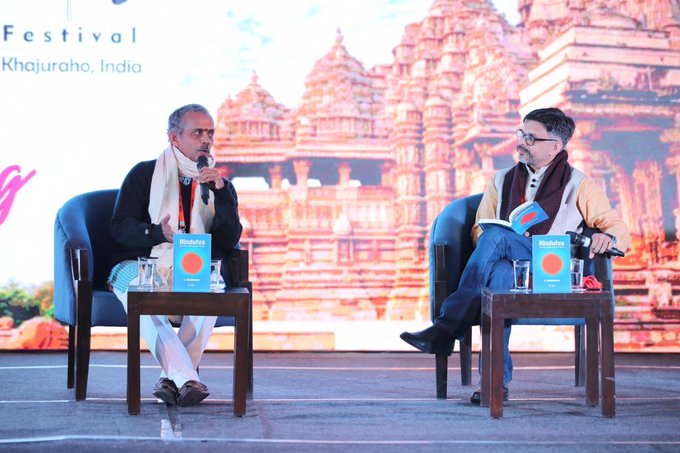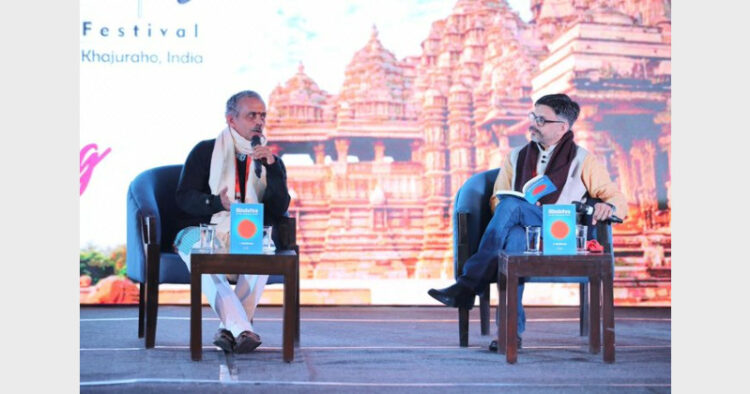
Resurgence of Hindutva in Contemporary Indian Political Discourse:
Shri Prafulla Ketkar is in conversation with Shri J Nandakumar
Set against the backdrop of the living example of India’s cultural heritage, the theme of the three-day event was ‘Forging unity by assimilating diversity’
The temple city of Madhya Pradesh hosted the second edition of the Khajuraho Literature Festival (KLF2020). The event was held at Khajuraho town of Chhatarpur district in Madhya under the aegis of Lok Neeti India Foundation.
Set against the backdrop of the living example of India’s artistic and cultural heritage, the theme of the three-day event (18-20th January 2020) was ‘Forging unity by assimilating diversity’. The festival sought to cover all the aspects of Indian society under the following sub-themes:
1. The relevance of ideology in the modern-day era of ‘jugaad’ politics
2. Changing/Shifting paradigms of developmental politics in New India
3. Cooperative and Collaborative Federalism: Mantra for effective governance in the 21st century
4. The resurgence of Hindutva in contemporary Indian political discourse
5. Assimilating diverse regional identities for robust nationalism: Opportunities and challenges
6. State, Identity and Citizenship: Recalibrating the foundations for a strong and prosperous nation
The inaugural session, ‘Media Ka Dharm”, was addressed by journalists from television, print and digital media. Speakers included Samir Abbas, TV9 Bharatvarsha, Aalok Shrivastava, senior journalist, poet and lyricist, Pranay Upadhyay, ABP News, Prakhar Srivastav News24, Swati Goel Sharma from Swarajya Mag and Priyanka Deo from New India Junction. TV journalist Pramila Dixit moderated the session.
Speaking at the session, Samir Abbas, said, “Social media is influencing the mainstream journalism to a great extent today. However, a journalist should remain honest to the profession of journalism and avoid taking sides.” Describing the role of media, senior journalists and editors spoke about the ‘dharma’ of media professionals in the present socio-political scenario.
An interaction for young authors and writers was another attraction of the day. Novelist Sai Swaroopa Kumar, author ShantanuGupta, Maj Saras Tripathi and Ramkrishna put forward their views. Novelist Saiswaroopa Kumar, author Shantanu Gupta and Ramkrishna also presented their views. “Social media plays a big role in the thought process, but for a while. However, the books are used as a reference, and they are forever. Everyone should write a book during their lifetime,” Shantanu Gupta said.
On the second and third day of the festival, national convenor, Prajna Pravah, J Nandakumar; Education Minister, Manipur Radheshyam Singh and Film director Vivek Ranjan Agnihotri spoke on various aspects of Hindutva and Hinduism.
‘Resurgence of Hindutva in Contemporary Indian Political Discourse’, A special conversation between Shri Prafulla Ketkar, the editor of Organiser Weekly, with Shri J Nandakumar was the main highlight of the second day. ‘Hindutva for the Changing Times’, the latest book of J Nandakumar remained the central theme of the discussion.
In a collection of published articles, Hindutva (Hindu-ness) is the apt expression that captures the spiritual, intellectual, religious, philosophical and political dimensions of the millennia-old Dharmic civilisation. “Most of my prose and verse happened after persistent compulsion from my fellow-karyakartas or publishers,” said Shri J Nandakumar. Hindutva does not believe in compartmentalisation of human life and experiences. It has been one of the most vicious Left-Liberal prejudices that Sanatana Dharma and Hindutva are different and somehow incompatible interests.
Topics including Changing paradigms of developmental politics in New India, State, Identity and Citizenship: Recalibrating the foundations for Strong and Prosperous Nation, etc. were discussed. The session State, Identity and Citizenship was addressed by senior journalist Aarti Tikoo, Founder, OpIndia Rahul Roushan, CEO, AsiaNet NewsNetwork Abhinav Khare, Chairman, Naga Ceasefire Monitoring Group Lt Gen Shokin Chauhan and Author; Chairman, Board of Governors IIM Kashipur Sandeep Singh.
“It was indeed a cultural festival. We all really enjoyed it. It offered a great learning experience for the people belonging to various sectors and ideologies,” a participant told Organiser.
As the theme of the event was ‘Celebrating Indian Culture’, a heritage walk, cultural events and traditional exhibition were also part of the literature festival. The heritage walk through the temple city of Khajuraho, a microcosm of the diverse Hindu worshipping systems, was ineffable. The transcendental beauty of Hindu architecture, which gave shape to the myriad temple structures spread over the village, captures profound beauty and philosophical outlook of Hindu civilisation.
Speaking to Organiser, the ideator of Khajuraho Lit Fest and founder of Lok Neeti, Satyendra Tripathi said, “Like the first edition of KLF, we did our best to choose vibrant topics and invite outstanding panellists and organise highly interactive and focused sessions. Our theme remains the same, celebrating India’s culture. KLF addresses the real India, which lives far from Lutyens’ Delhi.”
(With media inputs)













Comments